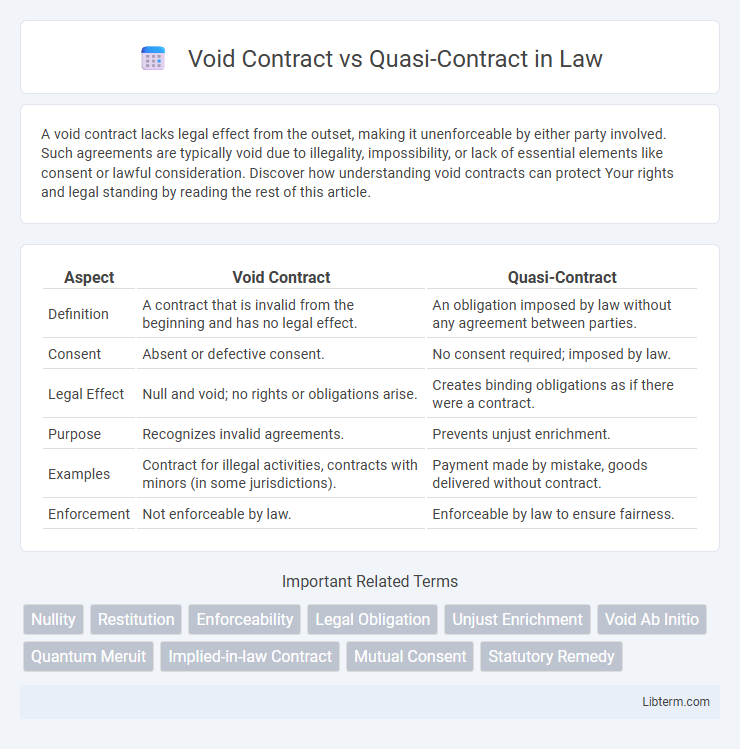A void contract lacks legal effect from the outset, making it unenforceable by either party involved. Such agreements are typically void due to illegality, impossibility, or lack of essential elements like consent or lawful consideration. Discover how understanding void contracts can protect Your rights and legal standing by reading the rest of this article.
Table of Comparison
| Aspect | Void Contract | Quasi-Contract |
|---|---|---|
| Definition | A contract that is invalid from the beginning and has no legal effect. | An obligation imposed by law without any agreement between parties. |
| Consent | Absent or defective consent. | No consent required; imposed by law. |
| Legal Effect | Null and void; no rights or obligations arise. | Creates binding obligations as if there were a contract. |
| Purpose | Recognizes invalid agreements. | Prevents unjust enrichment. |
| Examples | Contract for illegal activities, contracts with minors (in some jurisdictions). | Payment made by mistake, goods delivered without contract. |
| Enforcement | Not enforceable by law. | Enforceable by law to ensure fairness. |
Understanding Void Contracts: Definition and Features
Void contracts are agreements that lack legal validity from the outset, rendering them unenforceable by law. Key features include the absence of mutual consent, illegality of the object or consideration, and incapacity of parties involved, which collectively nullify any contractual obligations. Unlike quasi-contracts, void contracts do not create any rights or duties since they are considered void ab initio.
Exploring Quasi-Contracts: Meaning and Essentials
Quasi-contracts arise by operation of law to prevent unjust enrichment when no actual contract exists between parties, ensuring fairness and equity in transactions. They involve obligations imposed without mutual consent, typically requiring one party to compensate another for benefits received unjustly. Key essentials include the absence of an agreement, the benefit conferred, and the unjust enrichment requiring restitution.
Key Differences Between Void and Quasi-Contracts
Void contracts are agreements that lack legal enforceability from the outset due to illegality or incapacity, resulting in no obligations for parties involved. Quasi-contracts, however, are not actual contracts but legal constructs imposed by courts to prevent unjust enrichment, obligating a party to compensate another despite no formal agreement. Key differences include their origin (void contracts stem from invalid agreements, while quasi-contracts arise from equitable principles), enforceability (void contracts are null, quasi-contracts are enforceable), and purpose (void contracts recognize no rights, quasi-contracts ensure fairness and restitution).
Legal Basis of Void Contracts
Void contracts lack legal effect from inception due to the absence of essential elements such as consent, lawful object, or consideration, rendering them unenforceable under contract law. The legal basis of void contracts is rooted in statutory provisions and judicial precedents that emphasize principles like legality, capacity, and mutual agreement, ensuring contracts violating public policy or legal statutes are invalid. In contrast, quasi-contracts arise by operation of law to prevent unjust enrichment, established when no formal contract exists but obligations are imposed to ensure fairness.
Legal Basis of Quasi-Contracts
Quasi-contracts arise from obligations imposed by law to prevent unjust enrichment, even in the absence of an agreement between parties, as established under the Civil Code. Unlike void contracts, which lack legal effect due to defects like illegality or incapacity, quasi-contracts are grounded on equity and fairness principles recognized by jurisprudence. Legal basis of quasi-contracts primarily includes the doctrine of unjust enrichment, as upheld in landmark cases and statutory provisions that ensure restitution and protect parties from unfair loss.
Rights and Liabilities in Void Contracts
Void contracts create no legal obligations or enforceable rights since they are considered null from the outset, meaning parties cannot claim remedies based on such agreements. The liabilities arising from a void contract typically involve restitution or recovery of benefits conferred under unjust enrichment principles rather than contractual claims. Quasi-contracts, however, impose obligations by law to prevent unjust enrichment, granting rights and liabilities despite the absence of an actual contract.
Rights and Liabilities in Quasi-Contracts
Quasi-contracts impose liabilities based on equity and justice, ensuring no party benefits unjustly at another's expense, unlike void contracts which have no legal effect from inception. In quasi-contracts, the party receiving a benefit is obligated to compensate the other, establishing rights to restitution despite the absence of a formal agreement. This legal construct enforces liabilities and protects rights to prevent unjust enrichment and maintain fairness in transactions.
Enforceability: Void Contract vs Quasi-Contract
Void contracts are agreements that lack legal enforceability from the outset due to illegality or missing essential elements, rendering them null and void. Quasi-contracts, however, are not true contracts but obligations imposed by law to prevent unjust enrichment, enforceable even without mutual consent. Courts enforce quasi-contracts to ensure fairness when one party benefits at another's expense without a formal agreement.
Real-Life Examples of Void and Quasi-Contracts
A void contract, such as a contract made for illegal purposes like drug trafficking agreements, has no legal effect from the outset, rendering it unenforceable by law. In contrast, a quasi-contract, exemplified when a person pays another's debt by mistake or emergency medical services provided without prior consent, is imposed by courts to prevent unjust enrichment despite no formal agreement. These examples demonstrate how void contracts are inherently null, whereas quasi-contracts fill legal gaps to ensure fairness between parties.
Comparative Analysis: Void Contract vs Quasi-Contract
Void contracts lack legal enforceability due to essential element defects, rendering obligations nonexistent from inception. Quasi-contracts arise by operation of law to prevent unjust enrichment when no formal agreement exists, imposing obligations as if a contract were in place. While void contracts negate reciprocal duties, quasi-contracts create binding obligations based on equitable principles, filling gaps where actual consent is absent.
Void Contract Infographic

 libterm.com
libterm.com